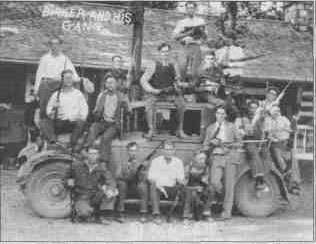THE UNDERGROUND LABOR FORCE
One small-time southern Illinois hood managed to earn notoriety and a noose while working from home
Review by Burney Simpson
A KNIGHT OF ANOTHER SORT:
PROHIBITION DAYS AND CHARLIE BIRGER
Gary DeNeal, 1998
Southern Illinois University Press
The image of the Illinois gangster is that of a gunman fighting for control in Chicago. During Prohibition, Al Capone and Bugs Moran made headlines selling liquor. Today, the 10 o'clock news likely leads with video of a lifeless teenager, allegedly a crack dealer, sprawled beneath a stained sheet on one of that city's street corners.
But Chicago has never had a lock on bad guys willing to make a buck selling goods and services off-limits to the law abiding.
Charlie Birger was a murderer, thief, pimp and bootlegger in southern Illinois who provided much comfort to the businessmen, coal miners and farmers of Williamson, Franklin and Saline counties during the first quarter of this century. His Shady Rest resort was a favored spot for illegal drink and bets on fighting dogs.
Actually, the resort, midway between Harrisburg and Marion, was just a dressed-up log cabin with a roadside barbecue stand as a front. If Birger ever earned an honest day's pay, he supplemented it with more lucrative work.
Gary DeNeal's A King of Another Sort: Prohibition Days and Charlie Birger chronicles this small-time hood's sordid but fascinating life. Southern Illinois Press published this second edition, with new photos and other material, last year. DeNeal's research is extensive and the writing is hardnosed, colorful, and occasionally humorous.
Birger's reputation for violent retribution was powerful, so much so that several of DeNeal's sources requested anonymity 70-some years after the gangster's death. But Birger also developed a reputation as a rural Robin Hood, giving away groceries and cash to folks down on their luck. And — a cost of doing business — he befriended local law enforcement, either with tips on the whereabouts of rival criminals, or with payoffs and services at his resort.
|
|
Along with the friendships, though, came enemies. First in the form of the Ku Klux Klan, an organization of local businessmen and political leaders who grew tired of the corruption. The Klan quickly mounted successful raids on bootlegging operations. Soon, these vigilantes got out of hand, too. In 1924, a shootout in downtown Herrin between factions of the Klan and the gangs left six dead and helped cement the national reputation of "Bloody Williamson" County. Birger denied involvement and was never brought to trial. And the Klan was effectively finished as a public organization. But Birger's most enduring enemies were his business rivals. He began fortifying, leveling trees surrounding his cabin to keep a better eye on those who might try to sneak up. Members of the Shelton gang responded by using a single engine plane to drop three homemade bombs near the resort. Two were duds, but a third exploded, purportedly killing an eagle and Birger's pet bulldog. |
The gang wars inevitably escalated and Birger eventually was convicted for the murder of the mayor of West City. According to DeNeal, though, the gangster was responsible for committing or ordering the murder of many others.
In 1928, Charlie Birger was led to the gallows in Benton. He wore a suit made by Al Capone's tailor.
